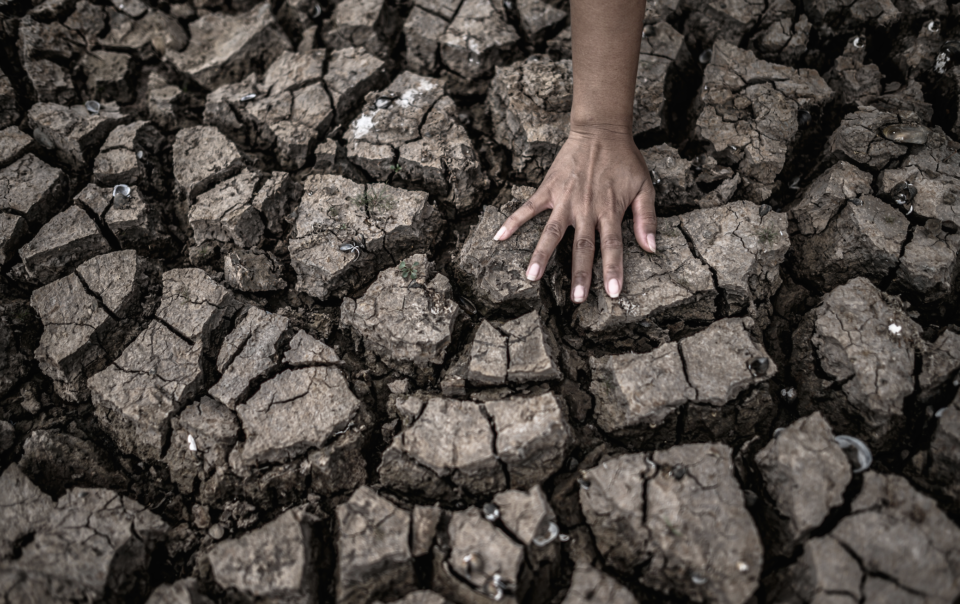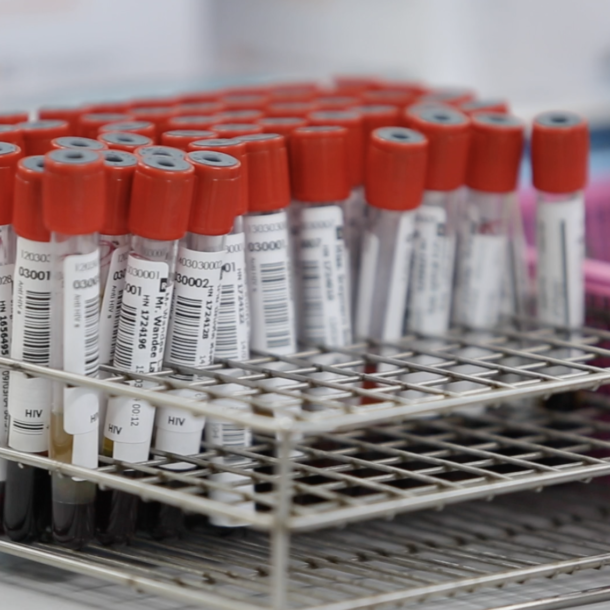
Ocean for Life สิ่งมีชีวิตในท้องทะเล ล้วนมีความสำคัญเป็นอย่างมาก ซึ่งที่ผ่านมาได้รับผลกระทบเป็นอย่างมากจากจากปัญหาขยะพลาสติกทางทะเล รวมไปถึง ความเสื่อมโทรมของทรัพยากรทางทะเลและชายฝั่ง
จากงานวิจัยล่าสุดในต่างประเทศพบว่า ในช่วงโควิด กิจกรรมของคนเกี่ยวกับทะเลลดลงอย่างเห็นได้ชัด ทั้งเรื่องของการขนส่ง การท่องเที่ยว และการใช้ทรัพยากรต่างๆ ทำให้ธรรมชาติสามารถฟื้นสภาพกลับคืนมาได้ เรียกได้ว่า ท่ามกลางการล็อคดาวน์ของผู้คน ทะเลและมหาสมุทรได้ใช้ช่วงเวลานี้ฟื้นตัวขึ้นเรื่อยๆ เป็นสิ่งที่ยืนยันให้เห็นว่ามนุษย์เรานี่เองที่เป็นตัวเร่งที่ทำให้เกิดปัญหา
เราได้พูดคุย update สถานการณ์เรื่องนี้ กับคนรักษ์ทะเลที่กำลังขับเคลื่อนเป้าหมายการพัฒนาที่ยั่งยืนที่ว่าด้วย Life below water หรือ SDG 14 นั่นคือ
- คุณนาถฤดี โฆสิตาภัย รองกรรมการผู้จัดการใหญ่ กลุ่มงานกลยุทธ์และพัฒนาธุรกิจ บริษัท ปตท.สำรวจและผลิตปิโตรเลียม จำกัด (มหาชน)
- รศ.ดร. โสภารัตน์ จารุสมบัติ ผู้ประสานงานชุดโครงการความรู้เพื่อขับเคลื่อนนโยบายทางทะเลแห่งชาติสู่ มหาวิทยาลัยธรรมศาสตร์
- คุณอเล็กซ์ เรนเดลล์ นักแสดงหนุ่มที่ผันตัวมาเป็น Co-founder & CEO, Environment Education Center Thailand
ทะเลวิกฤต สะท้อนปัญหาขยะจากบนบก
ดร. โสภารัตน์ เปิดมุมมองจากภาควิชาการว่า ก่อนสถานการณ์โควิด ทะเลวิกฤตพอสมควร เห็นได้จากปัญหาขยะพลาสติกทางทะเล ความเสื่อมโทรมของทรัพยากรทางทะเลและชายฝั่ง การใช้ทรัพยากรที่มากเกินไป และการสูญเสียความหลาก หลายทางชีวภาพทางทะเล ด้วยเหตุผลว่า ทะเลเป็นแหล่งทรัพยากรที่สำคัญ จึงมีการหยิบยกวิกฤติเหล่านี้มาพูดถึงตลอด ในช่วงโควิด นอกจากปัญหาเรื่องขยะที่มีอยู่เดิมแล้ว ยังมีภาพของเศษขยะที่เข้าสู่ระบบนิเวศมากขึ้นเรื่อยๆ ซึ่งยังไม่สามารถจัดการได้อย่างเต็มที่ และชี้ว่าโควิดทำให้เราเห็นภาพของกิจกรรมต่างๆทางทะเลที่เชื่อมโยงกับกิจกรรมมนุษย์บนบกที่กระทบทะเลมหาศาล เมื่อเราหยุดพักกิจกรรมบนบก หรือทำกิจกรรมที่ดี ก็ทำให้ทะเลฟื้นฟูได้ดีขึ้น และมีตัวเลขยืนยันว่า ปริมาณขยะที่เกิดขึ้นในทะเลนั้นแท้ที่จริงเกิดขึ้นมาจากบนบก เพราะฉะนั้น ถ้าเราพยายามจัดการ กิจกรรมต่างๆได้ก็จะช่วยลดปัญหาที่ทะเลปลายทางได้
ปตท.สผ. ยืนยัน ทะเลฟื้นตัวช่วงโควิด
ด้าน ปตท.สผ. ซึ่งดำเนินธุรกิจสำรวจและผลิตปิโตรเลียม มามากกว่า 35 ปี คุณนาถฤดี ได้แบ่งปันข้อมูลจากหน้างานของ ปตท.สผ. ที่มีพื้นที่ปฏิบัติการส่วนใหญ่อยู่ในทะเล ทั้งในและต่างประเทศ ว่าประเด็นทางด้านสิ่งแวดล้อมทางทะเลมีเพิ่มมากขึ้นเรื่อยๆ ย้ำว่า
“ทะเลคือแหล่งทรัพยากรธรรมชาติและระบบนิเวศที่สำคัญต่อการดำเนินชีวิตของมนุษย์และสิ่งมีชีวิตต่างๆ และในสถานการณ์โควิดในช่วงตลอดปีที่ผ่านมา ทะเลไทยได้พักและคืนสภาพอย่างเห็นได้ชัด สิ่งที่เห็นและจับต้องได้”
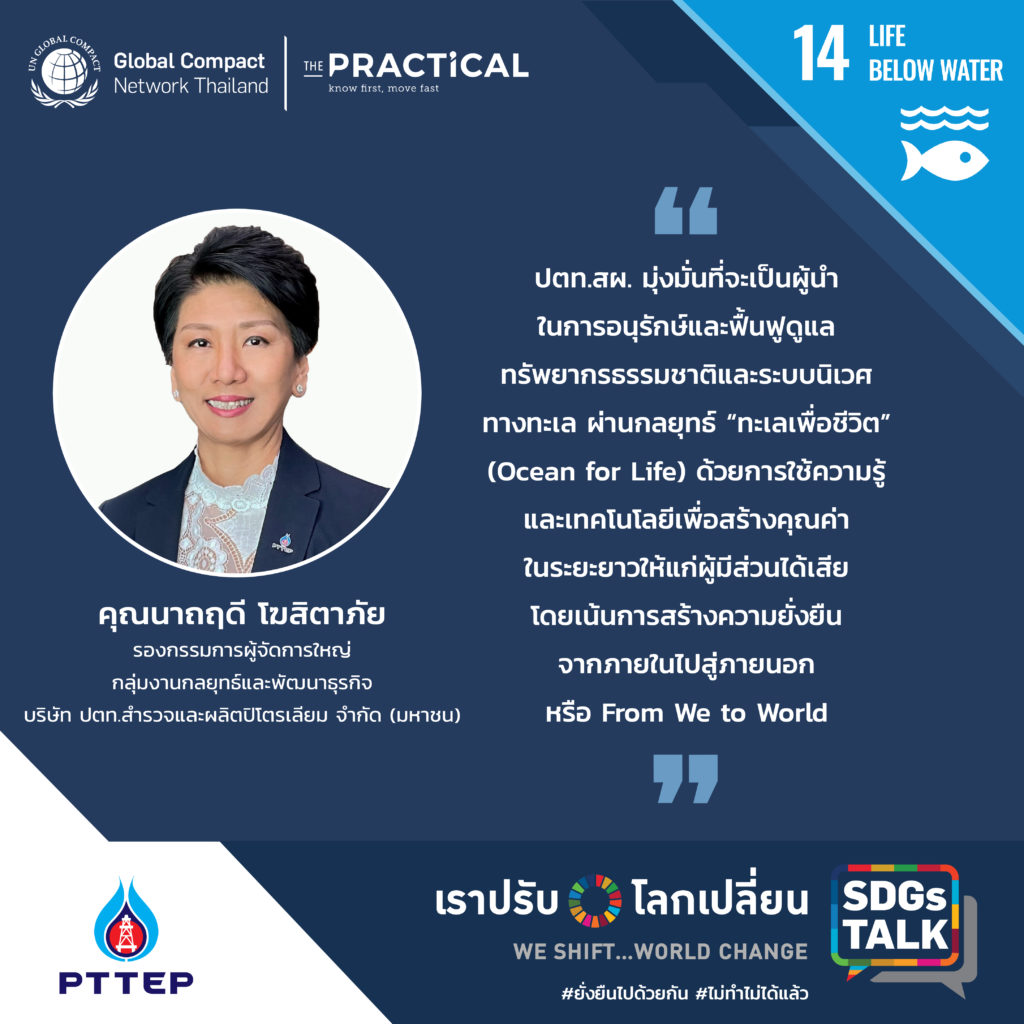
เช่น พบฉลามวาฬและโลมาเป็นฝูงใหญ่มากขึ้น แหล่งหญ้าทะเลและปะการังสมบูรณ์มีความหลากหลายมากขึ้น ชายหาดและคุณภาพน้ำทะเลที่สะอาดขึ้นอย่างที่ไม่เคยเป็นก่อน ซึ่ง ปตท.สผ. เองมีความมุ่งมั่นที่จะเป็นผู้นำในการอนุรักษ์และฟื้นฟูดูแลทรัพยากรธรรมชาติและระบบนิเวศทางทะเล โดยการใช้ความรู้และเทคโนโลยี เพื่อสนับสนุนการเติบโตทางเศรษฐกิจและคุณภาพชีวิตที่ดีของชุมชนบริเวณชายฝั่ง ภายใต้กลยุทธ์ ทะเลเพื่อชีวิต Ocean for Life เพื่อสนับสนุนการดำเนินงานด้านการอนุรักษ์ทรัพยากรธรรมชาติทางทะเลอย่างเป็นรูปธรรม โดยมีสองเป้าหมายระยะยาวในปี 2573 คือการสร้างมูลค่าเชิงบวกต่อความหลากหลายทางชีวภาพและบริการทางระบบนิเวศทางทะเลในพื้นที่ปฏิบัติงานนอกชายฝั่ง และการเพิ่มรายได้ของชุมชนและการเพิ่มจำนวนเครือข่ายอนุรักษ์
ปฏิบัติการ Ocean for Life ทะเลเพื่อชีวิต
คุณนาถฤดี เล่าให้ฟังถึงการทำงานของ ปตท.สผ. และการร่วมมือกับหลายหน่วยงาน ผ่านการดำเนินงานโครงการและกิจกรรม รวมถึงการพัฒนาองค์ความรู้ที่เกี่ยวข้อง เพื่อประโยชน์สูงสุดต่อความยั่งยืนทางทะเล ไม่ว่าจะเป็นการคำนึงถึง กระบวนการผลิตที่สะอาดและเป็นมิตรกับสิ่งแวดล้อม (Clean and Friendly Operation)
โดย ปตท.สผ. ได้นำเทคโนโลยีมาใช้ เพื่อลดผลกระทบเชิงลบจากการดำเนินการสำรวจและผลิตปิโตรเลียมให้เหลือน้อยที่สุด เช่น นำยานขับเคลื่อนใต้น้ำแบบอัตโนมัติ มาใช้ตรวจสอบและบำรุงรักษาอุปกรณ์ใต้น้ำ เพื่อลดความเสี่ยงในการหกและรั่วไหลสู่สิ่งแวดล้อม การตรวจติดตามสุขภาพของมหาสมุทรและความหลากหลายทางชีวภาพ (Ocean Health and Biodiversity Monitoring) โดยร่วมมือกับหน่วยงานต่างๆ เช่น กรมทรัพยากรทางทะเลและชายฝั่ง มหาวิทยาลัยเกษตรศาสตร์ สนับสนุนการดำเนินงานด้านวิทยาศาสตร์ทางทะเล เพื่อการอนุรักษ์และฟื้นฟูดูแลทรัพยากรธรรมชาติและระบบนิเวศ เช่น
- โครงการศึกษาไมโครพลาสติกในพื้นที่ไกลฝั่งของอ่าวไทย โดยใช้ความได้เปรียบของพื้นที่ปฏิบัติการนอกชายฝั่ง ในการเก็บข้อมูลตัวอย่างไมโครพลาสติก เพื่อใช้เป็นข้อมูลสนับสนุนในการจัดทำแผนป้องกันผลกระทบและมาตรการต่อต้านขยะทะเลระดับประเทศ
- โครงการติดตั้งกล้องใต้น้ำในบริเวณขาแท่นผลิต นำร่องในบริเวณแท่นอาทิตย์ เพื่อติดตามและจัดทำข้อมูลเกี่ยวกับความหลากหลายทางชีวภาพของสัตว์ทะเล เพื่อให้นักวิจัยสามารถเข้าถึงข้อมูลและใช้ประโยชน์ของข้อมูลต่อยอดในการวิจัยต่างๆที่เกี่ยวข้อง
- โครงการพัฒนาการสำรวจระบบนิเวศและกิจกรรมชายฝั่ง ด้วยการประยุกต์ใช้โดรนและเทคโนโลยีชั้นสูง เพื่อสำรวจพื้นที่การเพาะเลี้ยงสัตว์น้ำชายฝั่งและความสมบูรณ์ของพื้นที่แนวปะการัง โดยนำข้อมูลที่ได้ไปวิเคราะห์และจัดทำแผนที่/แนวทางในการใช้ประโยชน์และอนุรักษ์ทรัพยากรทางทะเล
รวมถึงการดำเนินโครงการเพื่อฟื้นฟู ดูแล อนุรักษ์ทะเลอย่างเป็นรูปธรรม (Ramp up CSR around Ocean) โดยร่วมมือกับกรมทรัพยากรทางทะเลและชายฝั่ง ผ่านโครงการต่างๆ อาทิ โครงการศูนย์การเรียนเพาะฟักสัตว์น้ำเศรษฐกิจ โดยขยายผลจากโครงการเรียนรู้เพาะฟักลูกปูม้าเพื่อเพิ่มทรัพยากรสัตว์น้ำและปล่อยคืนสู่ทะเล เพื่อให้ครอบคลุมการส่งเสริมและอนุรักษ์พันธุ์สัตว์น้ำที่มีความหลากหลายและแตกต่างกันในแต่ละพื้นที่ ปัจจุบันมีการจัดตั้งศูนย์ฯ ในจังหวัดสงขลา ปัตตานี นครศรีธรรมราช และมีเป้าหมายที่จะขยายไปยัง 17 จังหวัดรอบอ่าวไทยภายในปี 2573
ให้ความรู้คนรุ่นใหม่ ดูแลใส่ใจสิ่งแวดล้อม
คุณอเล็กซ์ นักแสดงที่เราคุ้นหน้าคุ้นตากันเป็นอย่างดี แชร์หลักคิดในการทำงานของ EEC ที่เชื่อว่าการให้ความรู้ คือ “การแก้ปัญหาที่ต้นเหตุ และการให้ความรู้จะเปลี่ยนแปลงความคิดของคน จะทำให้เขาอยากปกป้อง ดูแล และเป็น ความรักที่มนุษย์มีให้ต่อธรรมชาติ”
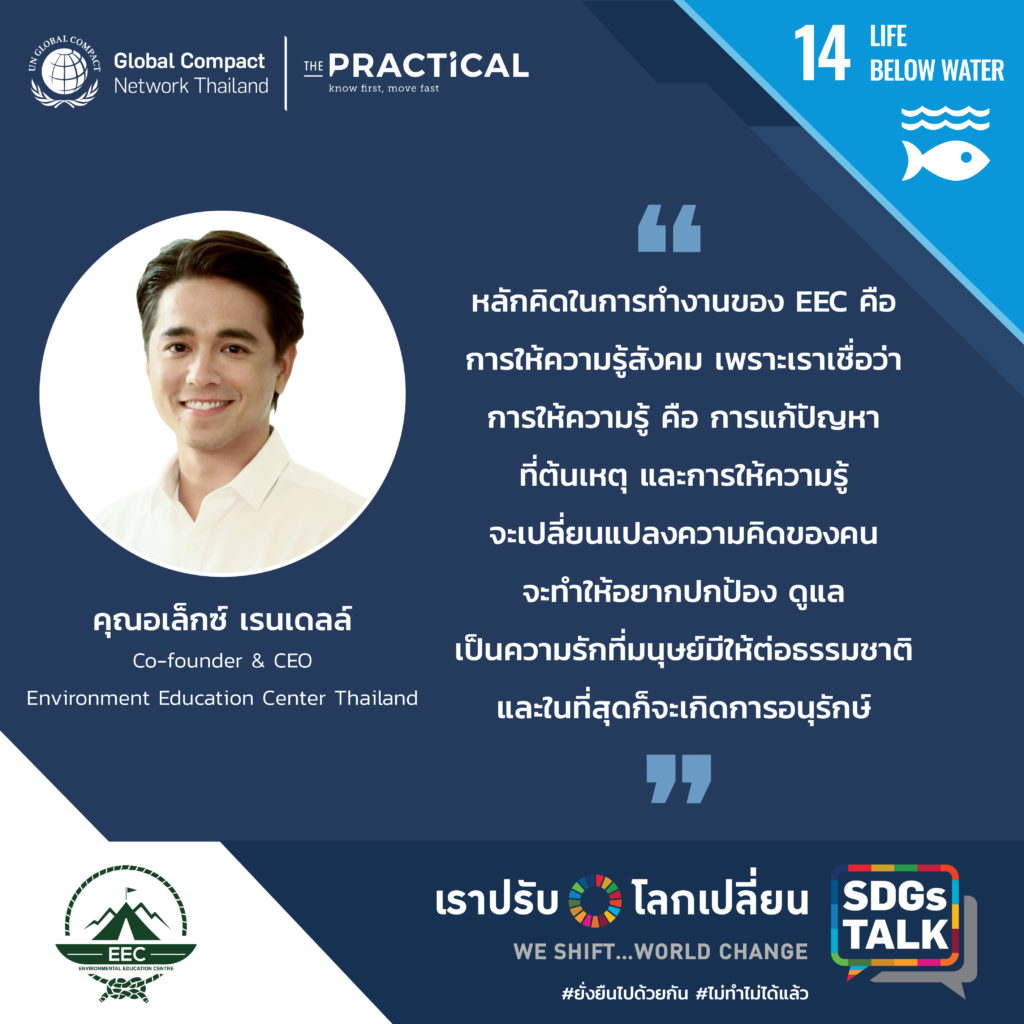
ในที่สุดก็จะเกิดการอนุรักษ์ และชื่นชมการทำงานของผู้เชี่ยวชาญหรือนักวิจัยทางทะเล เพราะได้เห็นการเสียสละของเขาที่คนเมืองทั่วไปไม่ได้เห็น และมองว่าหน้าที่ของ EEC คือ พยายามใช้สื่อที่มี นำเสนอเรื่องราวและข้อมูลต่างๆ เพื่อสร้างการตระหนักรู้สู่สังคม โดยส่วนตัวเชื่อว่า นักแสดงหรือใครที่เป็นคนของสังคมมีส่วนในการก่อร่างวิธีคิดของสังคมได้ เพราะฉะนั้น ถ้าสื่อสารอะไรจะส่งผลต่อสังคมได้มาก ต้องรับผิดชอบเรื่องนี้ด้วย และพยายามใช้ตรงนี้ให้เป็นประโยชน์มากที่สุด และชวนให้เปรียบเทียบเมื่อ 5-6 ปีกับวันนี้ ที่ถือว่าความสนใจเรื่องสิ่งแวดล้อมของคนในสังคมพัฒนามาได้ไกลพอสมควร เพราะหลายๆองค์กร เช่น ปตท.สผ. ที่ยกระดับการให้ความสำคัญเรื่องสิ่งแวดล้อม จนกลายเป็นส่วนหนึ่งของ mass media โดยไม่รู้ตัว ในช่วงแรกยากมากที่จะเห็นเรื่องสิ่งแวดล้อมในหน้าหนึ่งหนังสือพิมพ์ หรือ บน feed ใน Social Media แต่ตอนนี้กลายเป็นอยู่ทุกที่ นี่คือผลจากการขับเคลื่อนของทั้งภาครัฐ ภาคเอกชน และสังคมก็ให้ความสำคัญ ไม่ใช่แค่งานอดิเรกหรือจิตอาสา แต่กลายมาเป็นหนึ่งใน passion โดยเฉพาะคนรุ่นใหม่ และไม่ใช่เรื่องเทรนด์ที่วันหนึ่งจะลดลงไป วันนี้เรื่องความยั่งยืนกลายเป็น KPI ของศตวรรษหน้าที่ต้องวัดในทุกระดับ
ขับเคลื่อน Blue Economy เศรษฐกิจสีน้ำเงิน
นอกจากปฎิบัติการของภาคเอกชน และภาคสังคม ดร. โสภารัตน์ ได้ให้ข้อมูลเรื่องแนวคิด Blue Economy หรือ เศรษฐกิจสีน้ำเงิน ที่มุ่งขับเคลื่อนความยั่งยืนทางทะเล โดยมี knowledge platform ที่เชื่อมโยง stakeholder ทุกภาคส่วนเข้ามาเกี่ยวข้องในการทำงาน ซึ่งได้ใช้ความเป็นโครงการเชิงวิชาการทำหน้าที่เสนอประเด็นต่างๆ ให้ผู้ที่มีอำนาจในการตัดสินใจ หรือกำหนดนโยบาย (Policy Maker) และเป็นการสร้างความตระหนักรู้ให้กับสังคม
โดยแบ่งปันว่า ในฐานะที่เป็นอาจารย์ อยู่ในจุดตรงกลางระหว่างการทำงานของทุกภาคส่วน ที่จะเชื่อมระหว่างคนที่ทำงานในระดับวิชาการกับ policy maker ได้ เห็นว่าตอนนี้ทะเลเป็นประเด็นที่ถูกหยิบยกเข้าไปในการเรียนการสอนค่อนข้างมาก เช่น เด็กๆ เอาโครงการของคุณอเล็กซ์มานำเสนอ และรู้จักงานของ ปตท.สผ. เพราะมีพื้นฐานด้านสิ่งแวดล้อม มีงานวิจัยจำนวนมากภายใต้ Blue Economy เช่น การพัฒนาเรื่อง Ocean Account คือดูว่าทรัพยากรทางทะเลเป็นอย่างไร ถ้ามีการทำกิจกรรมต่างๆทางทะเล เช่น การท่องเที่ยว พลังงาน ขนส่ง และอีก 7-8 กิจกรรมที่กระทบกับความหลากหลายและระบบนิเวศทางทะเล ทำอย่างไรให้กิจกรรมเหล่านี้เกิดความยั่งยืน
อีกประเด็นที่สำคัญ คือ ความท้าทายของการดูแลเรื่องทะเล คือ Transboundary ที่ไม่ใช่เฉพาะทะเลในประเทศไทย แต่พิจารณาตั้งแต่ต้นน้ำ กลางน้ำ จนถึงปลายน้ำ การมองภาพ policy maker ต้องเข้าใจการเชื่อมร้อย และการขับเคลื่อนนโยบาย ต้องรู้ว่าโลกไปถึงไหนแล้ว เป็นความพยายามในการขับเคลื่อนกับ policy maker ทำอย่างไรที่จะได้ประโยชน์ หรือใช้โอกาสในการดูแลทรัพยากรธรรมชาติและสิ่งแวดล้อมภายใต้อนุสัญญาระหว่างประเทศ Untied Nation Law of the Sea (UNCLOS) ที่ต้องตอบโจทย์ให้ได้ประโยชน์จากเขตเศรษฐกิจทางทะเล
ความร่วมมือของคนรักษ์ทะเล
เมื่อถึงตรงนี้ คุณนาถฤดี ได้แบ่งปันข้อมูลเรื่องความร่วมมือว่า ในปี 2563 ปตท.สผ. ได้ลงนาม MOU สองฉบับ โดยฉบับแรกร่วมกับมหาวิทยาลัยเกษตรศาสตร์ และฉบับที่สองร่วมกับกรมทรัพยากรทางทะเลและชายฝั่ง เพื่อส่งเสริมและอนุรักษ์ให้เกิดความยั่งยืนของระบบนิเวศและสังคมเศรษฐกิจภาคทะเล รวมถึงการสร้างความร่วมมือกับชุมชนเครือข่ายกลุ่มอนุรักษ์ในพื้นที่เป้าหมาย เพื่อสนับสนุนการดำเนินกิจกรรมต่างๆ และขยายผลไปสู่สังคมในวงกว้าง นอกจากนี้คุณนาถฤดียังได้ชี้ให้เห็นความสำคัญของความร่วมมือว่า จะช่วยสร้างโอกาสในการเพิ่มขีดความสามารถของบริษัทในการทำโครงการด้านอนุรักษ์ทะเลในมิติที่กว้างขึ้น
รวมถึงการพัฒนาต่อยอดความรู้ทางด้านเทคโนโลยี การนำนวัตกรรมเอามาประยุกต์ใช้ในการดำเนินงานด้านอนุรักษ์และฟื้นฟูทรัพยากรทางทะเลให้เกิดผลอย่างเป็นรูปธรรม โดยเฉพาะเทคโนโลยีปัญญาประดิษฐ์และหุ่นยนต์ เพราะปัญหาที่สำคัญในการบริหารจัดการท้องทะเลและมหาสมุทร ทั้งในระดับสากลและระดับประเทศ คือ ความไม่สมบูรณ์ของข้อมูลทางสมุทรศาสตร์ต่างๆหรือข้อมูลที่ไม่เป็นปัจจุบัน โดยเฉพาะอย่างยิ่งข้อมูลบริเวณนอกชายฝั่งทะเล ซึ่ง ปตท.สผ. มีหน่วยปฏิบัติการส่วนใหญ่อยู่นอกชายฝั่งทะเล ทั้งในประเทศไทย พม่า และมาเลเซีย จึงมองว่าความได้เปรียบในสถานที่ตั้ง ความพร้อมทางด้านเทคโนโลยี รวมถึงความสามารถในการประสานความร่วมมือกับหน่วยงานต่างๆ จะสร้างความแตกต่างในการผลักดันให้ ปตท.สผ. เป็นผู้พิทักษ์อนุรักษ์ทะเล เพื่อสร้างความยั่งยืนให้มหาสมุทรได้ และย้ำว่า การบริหารจัดการประเด็นปัญหาทางทะเล ถือเป็นความท้าทายมาก เพราะทะเลเป็นพื้นที่ที่มีความกว้างใหญ่ เกี่ยวข้องกับระบบนิเวศและการดำเนินชีวิตของสิ่งมีชีวิตที่หลากหลาย และผลกระทบที่เกิดขึ้นสามารถสร้างความเสียหายไปยังบริเวณอื่นๆในวงกว้างได้อย่างรวดเร็ว ดังนั้นการแก้ไขปัญหาต้องบูรณาการในทุกมิติ โดยอาศัยความร่วมมือจากทุกภาคส่วน ไม่เพียงเฉพาะองค์ใดองค์กรหนึ่ง
ชวนทุกภาคส่วนร่วมเป็นพันธมิตร คืนชีวิตให้ทะเล
ดร. โสภารัตน์ ชี้ว่าการที่ประเทศจะได้ประโยชน์จากการพัฒนาจะต้องทำงานไปด้วยกัน สิ่งที่สำคัญ คือต้องทำให้ภาครัฐเห็นความสำคัญให้ได้ เพื่อให้เรื่องนี้สามารถเกิดขึ้นได้จริง ทั้งการให้ความรู้ การสร้างคนรุ่นใหม่ ซึ่งเป็นสิ่งที่สำคัญมาก จากประสบการณ์การจัดเสวนา พบว่านักวิชาการทางทะเลไทยมีจำนวนน้อย ดังนั้น จึงต้องสร้างคนรุ่นใหม่ขึ้นมาให้มากขึ้น โดยกลไกที่สำคัญในการขับเคลื่อนเรื่องนี้ คือ การเป็น partnership โดยเฉพาะภาคเอกชนที่มีโอกาสสูง ทั้งในเรื่องของเทคโนโลยีและการเงิน จึงต้องส่งเสริมให้ภาครัฐทำงานกับภาคเอกชน และชุมชนให้ได้
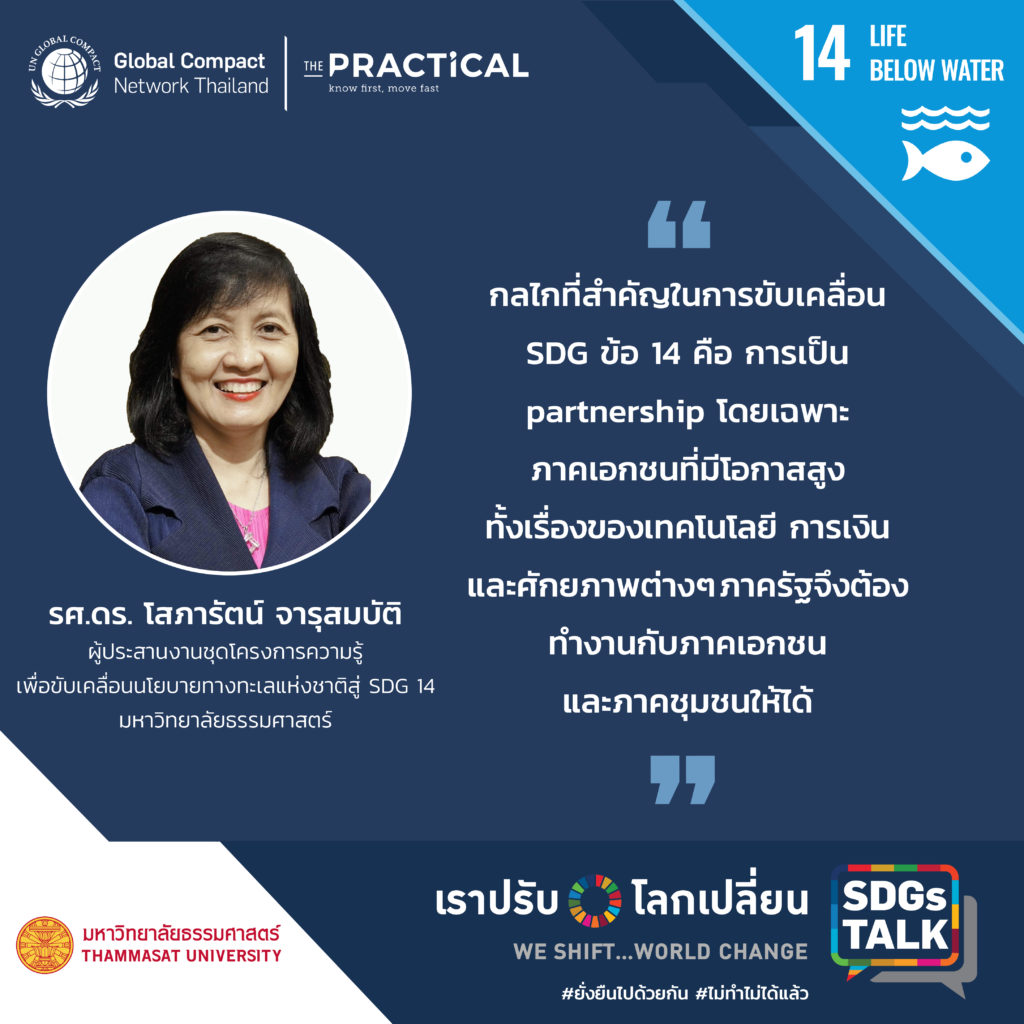
พร้อมชี้ว่าส่วนสำคัญที่ภาครัฐควรทำในอนาคต คือ เครื่องมือทางการเงินแบบใหม่ โมเดลทางธุรกิจแบบใหม่ เช่น ในต่างประเทศมี Blue Bond เพื่อช่วยกลุ่ม SME หรือบริษัทเล็กๆ เพื่อให้สามารถพัฒนาและเติบโตได้ รวมทั้ง สถาบันการศึกษาในพื้นที่ ต้องมีบทบาทสำคัญมากกว่านี้ ในการสนับสนุนองค์ความรู้ให้กับชุมชนในพื้นที่ สนับสนุนกิจกรรมของคนรุ่นใหม่ให้เป็นรูปธรรมมากขึ้น หลังโควิด เชื่อว่าคนรุ่นใหม่จำนวนมากต้องกลับภูมิลำเนา เพราะโอกาสการทำงานในเมืองอาจจะน้อยลง จะทำอย่างไรให้คนรุ่นใหม่กลับไปทำอาชีพใหม่ๆในพื้นที่ และสามารถดำเนินชีวิตอยู่ได้ โดยเฉพาะที่ต้องไปอยู่กับเศรษฐกิจฐานราก ซึ่งทะเลเป็นแหล่งสำคัญในการพัฒนาให้เกิดอาชีพได้อีกมาก
สิ่งแวดล้อมศึกษา การเรียนรู้ที่เริ่มได้ตั้งแต่อนุบาล
ในเรื่องนี้ คุณอเล็กซ์ แชร์มุมมองส่วนตัวว่า จุดที่ดีที่สุดและทางออกปัญหา คือ ควรมีนโยบายให้โรงเรียนทุกโรงเรียนเรียนเรื่องสิ่งแวดล้อมศึกษา ตั้งแต่อนุบาลหนึ่ง เพิ่มระดับไปเรื่อยๆ จนถึงระดับมหาวิทยาลัย เพื่อปลูกฝังเด็กรุ่นต่อไปให้เรื่องนี้อยู่ในชีวิตประจำวัน การดูแลทรัพยากรธรรมชาติควรจะเป็นส่วนหนึ่งที่อยู่ภายในตัวเด็กๆ ไปในระยะยาว
โดยต่อไป EEC จะพัฒนางาน พัฒนาหลักสูตรต่างๆให้มากขึ้น เพื่อเข้าหานักเรียนให้มากขึ้น โดยปัจจุบันเด็กๆที่มาเข้าค่ายกับ EEC ส่วนมากเป็นเด็กที่อยู่ในกรุงเทพฯ อยู่ในเมือง หรือโรงเรียนนานาชาติ และเน้นการขยายผลที่จะทำให้มีโอกาสไปพบคนพื้นที่มากขึ้น เพราะเห็นว่าคนพื้นที่จะทำหน้าที่อนุรักษ์อย่างแท้จริง เพราะนั่นคือบ้านของเขา
ดังนั้น การสร้างกระบวนการให้กับคนพื้นที่ค่อนข้างสำคัญ เวลาที่ไปภาคใต้จะเห็นชัดเจนว่า SDG ข้อ 14 มีความสำคัญมากรวมทั้งในค่ายจะพยายามนำประเด็น SDGs มาสอนมากขึ้น เพื่อให้เห็นว่าแต่ละเรื่องมีความเชื่อมโยงกัน ไม่ใช่แค่ทางทฤษฎีแต่สามารถที่จะเห็นได้จริง เพราะถ้าทรัพยากรทางทะเลไม่สมบูรณ์จริง ชาวบ้านจะได้รับผลกระทบมาก ปะการังจะนำไปสู่เศรษฐกิจ นำไปสู่การท่องเที่ยว และเศรษฐกิจบ้านเรา 80% คือการท่องเที่ยวเชิงนิเวศที่มีค่ามหาศาลต่อการเป็นอยู่ของทั่วประเทศเพราะฉะนั้น การดูแล SDG 14 จะส่งผลให้กับ SDGs อีกหลายข้อ ในฐานะคนทำงาน EEC ที่พยายามขับเคลื่อนเรื่องนี้ จะพยายามสื่อสารและสร้างการเปลี่ยนแปลงให้ได้มากที่สุดเท่าที่จะเป็นไปได้
ความหวังทะเลไทย สร้างคนรุ่นใหม่รักษ์ทะเล
ในช่วงท้าย ดร. โสภารัตน์ ฝากความหวังไว้กับคนรุ่นใหม่ และย้ำว่า การให้ข้อมูลที่สามารถเห็นภาพของการเปลี่ยนแปลง จะเป็นความท้าทาย ที่ทำให้คนรุ่นใหม่รู้สึกตื่นตัวและสนใจที่จะเข้ามาเรียนรู้สิ่งเหล่านี้มากขึ้น และสร้างความตระหนักว่าแม้จะเป็นปัญหาใหญ่ แต่เราทุกคนสามารถสร้างการเปลี่ยนแปลงได้ เพราะทุกอย่างเริ่มต้นที่ตัวเอง เมื่อเปิดโอกาสให้คิดและทำกิจกรรมที่เป็นรูปธรรมได้ คนรุ่นใหม่ๆ ก็อยากทำ ซึ่งการทำงานที่ผ่านสื่อจะเป็นสิ่งหนึ่งที่ช่วยให้คนรุ่นใหม่สามารถเข้าถึงและติดตามกิจกรรมได้ง่าย
คุณอเล็กซ์ เสริมว่าทุกวันนี้การเรียนเรื่องสิ่งแวดล้อมกลายเป็นสิ่งสำคัญมาก และมีโอกาสที่สังคมสนับสนุนมากขึ้นกว่าแต่ก่อน โดยตัวอย่างในหลายองค์กรที่ทำเรื่องสิ่งแวดล้อม เป็นส่วนหนึ่งของ CSR และตอนนี้ขยายเป็นเรื่อง sustainability มีหลายองค์กรมีแผนกดูแลเรื่องความยั่งยืน ทั้งเรื่อง sustainability, sustainable finance, sustainable life ครอบครัว พนักงาน การบริโภค ดังนั้น น่าจะเป็นเหตุผลที่ทำให้คนรุ่นใหม่มีความฝันที่อยากทำงานด้านนี้ ที่ไม่ใช่งานอดิเรก หรืออาสาสมัคร แต่เป็นงานจริงๆ ที่มีโอกาสได้ทำงานจริงจังทุกวัน โดยผู้บริหารองค์กรใหญ่อย่าง คุณนาถฤดี ได้ตอบรับ และเปิดโอกาสว่า ปตท.สผ. ยินดีให้ข้อมูล ความร่วมมือ ทั้งงานวิจัยและกิจกรรมสังคม โดยมี Ocean for Life เป็นธีมหลัก และย้ำว่า ปตท.สผ. พร้อมที่จะทำงานกับทุกภาคส่วนเพื่อร่วมกันขับเคลื่อนเรื่องนี้
….
รายการ “เราปรับ…โลกเปลี่ยน We Shift…World Change”
ตอน “รักทะเล รักษ์ต้นทางทรัพยากร”
หรือ จะเลือกรับฟังรายการ ในรูปแบบของ Podcast ได้ที่:
ติดตามชมรายการ “เราปรับ…โลกเปลี่ยน We Shift…World Change” Facebook
ได้ทาง Facebook เพจ @มนุษย์เงินเดือนพันธุ์ใหม่ หรือ Facebook Global Compact Network Thailand และ ช่องทาง Social Media ของ The Practical

